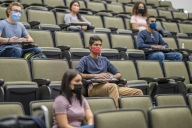You have /5 articles left.
Sign up for a free account or log in.
University administrators enthusiastically participated in a House of Representatives subcommittee hearing on the state of research infrastructure at American institutions, telling a mostly sympathetic group of lawmakers that their financial needs are great if the country is to remain scientifically and economically competitive. The chairman of the House Science Subcommittee on Research & Science Education, Rep. Daniel Lipinski (D-Ill.), citing a 2005 report saying that "academic institutions were deferring $3.5 billion in needed renovation projects," said he was "worried that unless we actively modernize our R&D facilities that we could not only be spending federal research dollars inefficiently, but that we could lose our position as scientific leaders, finding it harder to attract top scientists and engineers." The academic administrators who testified -- Leslie Tolbert of the University of Arizona, Albert Horvath of Pennsylvania State University, John R. Raymond of the Medical University of South Carolina, and Thom Dunning of the University of Illinois at Urbana-Champaign -- offered various perspectives on the problems their institutions faced, but all of them sent the message that more federal funds, through the National Science Foundation or other agencies, were needed to help offset declines in fund raising, state appropriations and other funding sources. While nobody openly disagreed or said such support would be a bad idea, Rep. Vern Ehlers, a Michigan Republican who has long been a champion of science, said he had "mixed feelings" about the idea of direct research infrastructure support from the federal government and said it would represent "a change in direction" that the government should not undertake lightly.









